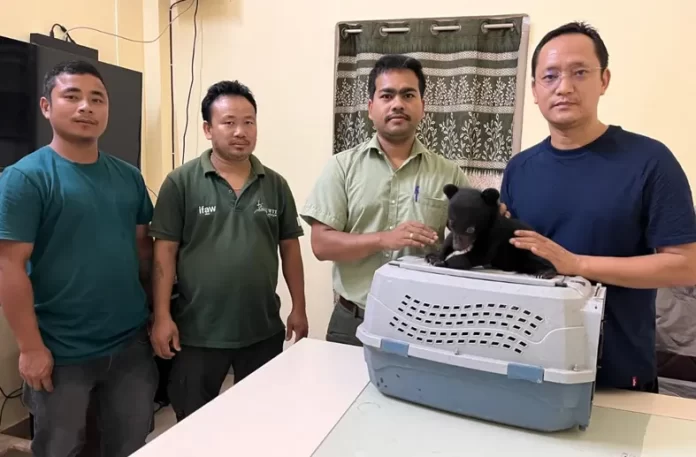ITANAGAR, 2 May: A male Asiatic black bear cub was rescued from Sagalee in Papum Pare district by the environment, forest & climate change department, and was handed over to the Centre for Bear Rehabilitation and Conservation (CBRC) at the Pakke Tiger Reserve by a team led by Itanagar Zoological Park veterinarian Dr Sorang Tadap last week, the Wildlife Trust of India (WTI) informed in a release.
The cub, estimated to be a month old, had likely been separated from its mother, who is believed to have been a victim of poaching, it said.
“This marks the 85th bear cub that has been received by the CBRC since its establishment in 2004,” the WTI informed.
The CBRC is jointly run by the WTI and the state environment & forests department. The project is supported by the International Fund for Animal Welfare and Kirloskar Ebara Pumps Limited. It is the only facility in India dedicated to hand-raising and rehabilitating orphaned bear cubs.
CBRC Head Dr Panjit Basumatary said, “Upon examination, we found the cub to be significantly dehydrated, weighing a mere 2.3 kgs. Within the week following admission, it has gained some weight and is showing signs of improved health and activity.”
The Asiatic black bear is categorised as ‘vulnerable’ by the IUCN Red List of Threatened Species, and is protected under Schedule 1 of India’s Wildlife (Protection) Act, 1972.
“However, it faces numerous challenges, including shrinking habitats due to logging, agriculture expansion, roadway networks, and dams,” the WTI said, adding that the primary threat in Arunachal is poaching.
“Bear meat, bile, and claws hold a huge commercial value in the illegal wildlife trade market. Young cubs are often orphaned due to hunting or poaching of the mother, and are either picked up to be sold or kept at home as pets,” the release said.
Asiatic black bear cubs spend between two and three years under the close supervision of their mothers to learn vital survival skills. At the CBRC, these orphaned cubs undergo a similar rehabilitation process, which includes hand-raising, acclimatisation and weaning, alongside regular walks in the forest with experienced animal keepers, to help them adapt to their surroundings.
“Eventually, the cub is released back into the wild, giving them a second chance at life in their natural habitat. Alongside rescue and rehabilitation of bear cubs, the team at CBRC, in collaboration with the forest department, also undertakes awareness drives, urging a complete stop to the hunting of the species,” the release said.
The WTI is a conservation organisation established in 1998 with a mission to conserve nature, especially endangered species and threatened habitats, in partnership with communities and governments.
In its 25 years of operations, the WTI has saved more than 50,000 animal lives, trained and equipped over 20,000 frontline forest staffers, assisted the government in creating seven protected areas, sensitised 31 lakh children to conservation, and assisted enforcement agencies in combating wildlife crimes.


